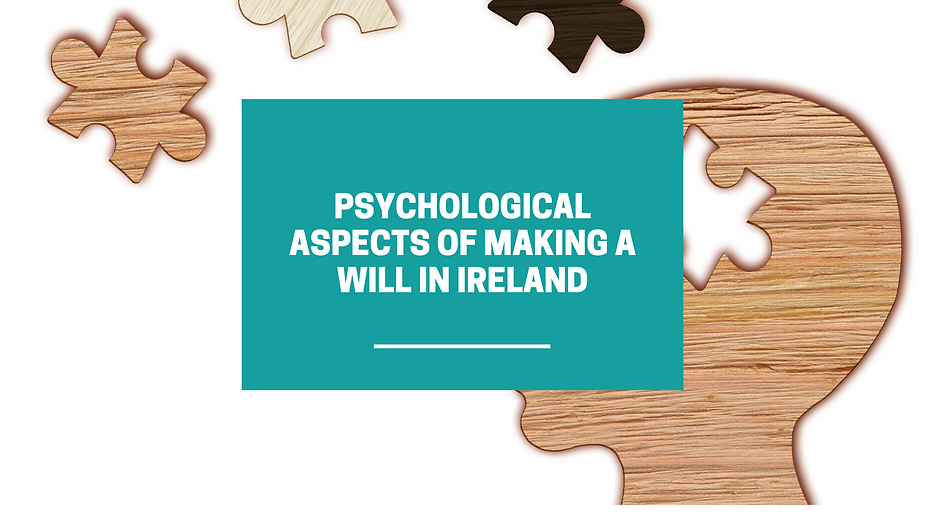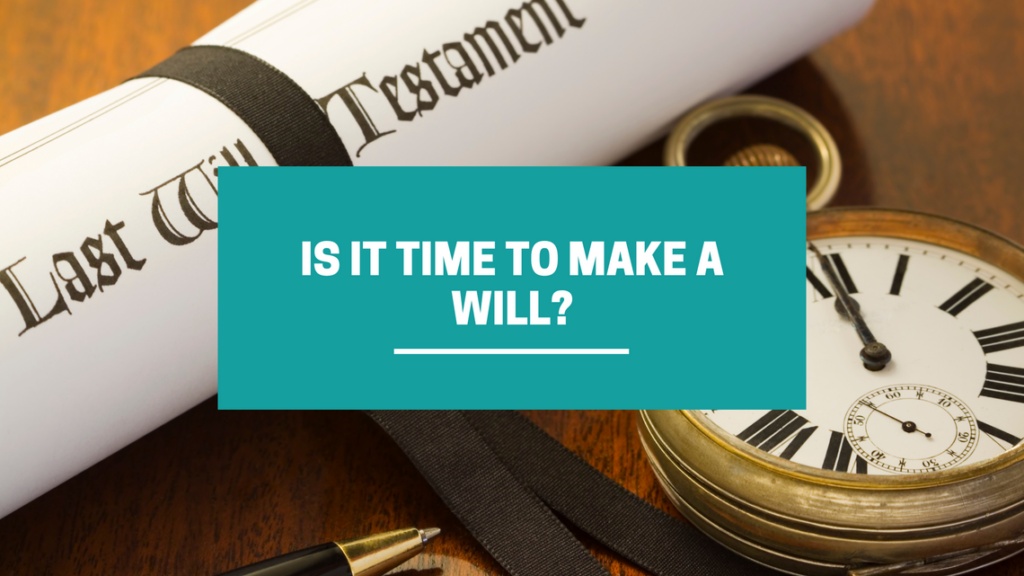The Psychological Aspects of Making a Will in Ireland: Ensuring Peace of Mind

Introduction In Ireland, making a will is not a legal process but also an emotionally significant undertaking. It involves considering one’s mortality, making decisions about assets and loved ones, and facing potential conflicts among family members. Understanding the psychological aspects surrounding the creation of a will is essential to ensure peace of mind, promote familial harmony, and protect the wishes of the testator. This blog delves into various psychological factors involved in making a will in Ireland and offers insights into how individuals can navigate these complexities. 1.Mortality and Facing One’s Own Legacy Creating a will requires individuals to confront their own mortality. Acknowledging the inevitability of death can evoke strong emotions, such as fear, anxiety, and even existential contemplation. However, embracing this process can also lead to a sense of empowerment and provide an opportunity for individuals to leave a meaningful legacy behind. Recognizing that a will serves as a tangible expression of one’s values, beliefs, and desires can help alleviate the emotional burden associated with contemplating one’s mortality. 2.Decision-Making and Clarity on Intent. When drafting a will, individuals must make important decisions regarding the distribution of their assets, appointment of guardians for minor children, and even healthcare directives. These decisions can be complex and emotionally challenging. It is crucial to approach the decision-making process with a clear mind, carefully considering the implications of each choice. Seeking legal advice from a professional can provide guidance and clarity, ensuring that one’s intentions are accurately reflected in the will. 3.Family Dynamics and Potential Conflicts Family dynamics often play a significant role in the creation of a will. In Ireland, where strong family ties are common, potential conflicts can arise when it comes to dividing assets among beneficiaries. The expectation of fair treatment, concerns about favouritism, or differing interpretations of the testator’s intentions can create emotional turmoil and strain family relationships. Open and honest communication with loved ones during the estate planning process can help address these concerns and minimize he likelihood of disputes after one’s passing. 4.Emotional Considerations and Inter-generational Equity One aspect often overlooked during the will-making process is the emotional impact on beneficiaries. Unequal distribution of assets can create feelings of resentment, jealousy, or hurt among family members. Balancing the desire to treat loved ones fairly with the individual circumstances in needs of each beneficiary is essential. Communicating the reasons behind specific decisions, seeking professional advice, and considering inter-generational equity can help reduce potential emotional distress and promote harmony among family members. 5.Updating and Reviewing the Will Life is dynamic, and circumstances change overtime. Regularly reviewing and updating a will is essential to reflect any significant life events, such as births, deaths, marriages, or divorces. Failing to update a will can lead to unintended consequences, including disputes and legal challenges. Regularly reviewing and revising one’s will ensure that it remains an accurate reflection of the testator’s wishes, reducing potential emotional and legal complications. Conclusion Making a will in Ireland is not just a legal process but also a deeply psychological one. It involves contemplating mortality, making difficult decisions, and navigating complex family dynamics. By understanding and addressing the psychological aspects involves, individuals can ensure peace of mind, protect their wishes, and promote harmony among their loved ones. Seeking professional advice, maintaining open communication, and regularly reviewing the will are essential steps in creating a comprehensive testament hat reflects one’s values and intentions. Through thoughtful consideration, individuals can leave a lasting legacy and provide comfort and clarity to those they leave behind. If you have any queries on the Will drafting you can contact our Will and probate Department on 01-4854563 or lisa@mckennaandcosolicitors.com
Is it Time to Make a Will?

With Christmas approaching writing your will is not likely to be the first thing on your mind but it is something to be mindful of. Society today often talks about living in the moment bur sometimes future planning is essential. Many people say that they should draft a will at some point but will continuously place the idea on the back burner for another day because they don’t want to think about the future. This is a completely natural reaction, but it could be time to take the plunge and finally remove this task from your checklist. This piece explores the importance of drafting a will in Ireland and the correct procedure for doing so. Wills – What are they and How do you make one? So, what is a will? A Will is a legal document that sets out the destination of an individual’s assets upon them passing away. In Ireland, the writing of a Will is governed by the Succession Act 1965. To create a valid Will according to the Act, it must be in writing and signed by the person who wishes to create the Will (known as the testator). The testator will sign their Will in the presence of two witnesses, both of whom will also sign the document. So, in theory, even a Will that is written on the back of a receipt or on a chocolate bar wrapper can be binding once all formalities are followed! To make a Will, a person must be over the age of 18 or married, and must be of ‘sound disposing mind’ at the time of writing the document for it to be legally enforceable. Importance of Having a Will The reasons for making a Will all tend to revolve around the idea of certainty. Certainty as to Destination of Belongings: Arguably, the most important reason for writing a Will is to ensure that the testator or testatrix can be certain of what will happen to their belongings when they die. Everyone has something of financial or sentimental that they would like to ensure will land into the correct hands. You can draft an enforceable will on your own once it is in writing, signed and witnessed. However, it is beneficial to enlist the help of a solicitor who can follow you through the legal process. The solicitor will ensure that all formalities are followed, and that the wording of the Will will not lead to the document being struck down for uncertainty or difficulties in its interpretation. Appointment: Another advantage of drafting a Will is that it gives you the opportunity to appoint a trustworthy or reliable person as your executor or personal representative. This person is responsible for applying for a Grant of Probate from The Probate Office upon your death, and distributing your estate in accordance with your wishes. A solicitor may also represent you in this regard if you so wish. On a similar note, where you have a young family, drafting your Will gives you an opportunity to appoint a trustworthy guardian for your kids so that you can rest in the knowledge that they will be looked after if you pass. Forward Planning and Tax Reasons: Writing a Will gives you the opportunity to sit down and make a list of your assets. This will not only allow you to financially plan for your future but also influence the future of the beneficiaries under the Will. Having your assets all in one place allows you to smartly divide your estate in a way that will prevent your beneficiaries from having to pay a high amount of inheritance tax for example. Residuary Clauses: Even where you fail to account for all of your assets, a residuary clause can be inserted into the Will to make provision for any outliers (or residue) in your estate so that they can be distributed as you wish. Intestacy – What will happen if you don’t make a Will? What happens if you die without a Will? This scenario is known as intestacy. Intestacy has its own set of complex rules under the 1965 Act as to the disposal of a person’s estate. Under these rules, a person’s estate is automatically passed to their next of kin (a spouse or closest blood relative). For example, where you are married or in a civil partnership, all of your estate will be transfered to your surviving spouse automatically upon your death. More complicated scenarios arise depending on your individual circumstances. Family trees may have to be traced to find you next surviving blood relative. An intestacy situation may not reflect the deceased wishes and in some circumstances could result in your belongings being devised to a blood relative that you have never met. Where no blood relative exists, the Irish State will take ownership of the assets as ‘Ultimate Successor”. Intestacy only caters for traditional categories of relationship and does not take into account that Ireland today has many blended families. So, for example, if you wish to leave something to a friend or an (unadopted) step child and do not make a Will, intestacy will not take this relationship into account. In conclusion, drafting a Will is beneficial as it is a form of ‘security blanket’, giving the testator peace of mind and certainty that their exact wishes will be carried out when they die. Many people struggle to take steps to think about their future but unfortunately, we all need to take a leap of faith once in a while. Maybe 2023 will be the year for yours? Please note that the content of this blog does not amount to professional advice. Legal advice should be sought in respect of specific queries. This update is provided on the basis of information available as at November 2022. The author of this blog is Jonathan Delany and Lisa McKenna, please contact our Probate
Certainty, Conflict, Comfort: Benefits of a valid will

Caring for loved ones, avoiding tax and peace of mind just some of the benefits 1. Your Choice With a valid will, you get to decide what happens to your possessions. Without one, the rules of intestacy will apply, taking the personal decision from your hands and putting it into generic rules that don’t take your wishes into account. 2. Loved ones If certain loved ones don’t fit into the intestacy rules, they will be unaccounted for on your passing. For example, if you are not married and you don’t have a will, your partner may not receive anything. Depending on the circumstances of the case, this could create financial hardship for the loved one left behind. If you have children and haven’t gotten a will in place, it’s likely that you haven’t thought about who will be their guardians should anything happen to you. Alternatively, maybe you have asked someone specific to be their guardian on the event that something happens to you. Without a will, this oral agreement may not be seen as valid and could be dismissed. Creating a will ensures certainty and peace of mind when it comes to protecting minors. 3. Inheritance Tax Being engaged and attuned to who gets what on your death may allow some people to avail of certain reliefs and reduce the amount of tax they pay out. Knowing this in advance will provide certainty and comfort to those who stand to benefit. 4. Conflict Knowing the contents of a will and that they are the desires of the testator will inevitably avoid family conflicts when you have passed. Having a valid will in place will make it much harder for someone to contest it, which ultimately gives you, as the testator, more peace of mind knowing that your possessions are going to whom exactly you want them to. Please do not hesitate to contact our wills and probate team on 01 485 4563 should you have any queries in relation to any of the above. Image by Gerd Altmann from Pixabay
Do It Yourself? Why it’s a bad idea for Wills

Invalid wills create cost and trouble for family and friends Trying to draft and execute your own will can sound like a good idea now, but in the long term can create issues, costs and emotional distress for relatives left behind. If you’ve a complicated situation with your assets or friends/family, a DIY will is risky. What if you have children from more than one relationship or are cohabitating but are separated? What happens then? These are questions you may fail to address if you create your own will, which could leave some people out in the cold when it comes to what assets you’re leaving them. For example, do you want to include any step-children as your children? Do you know how to make sure that a bequest to your daughter goes to her children if your daughter dies before you, rather than going back into the estate, to the advantage of other beneficiaries? Mistakes are commonplace and unfortunately, can lead to expensive legal disputes, and tense relations between family members. As well as that if you have already made a Will but you get married or enter into a civil partnership your Will is automatically revoked so a new one will be required. So, when it comes to making a Will, it can be a false economy to try to do-it-yourself, especially when it’s usually a simple matter just to touch base with your solicitor to make sure that you aren’t missing something important. Image by Gerd Altmann from Pixabay
